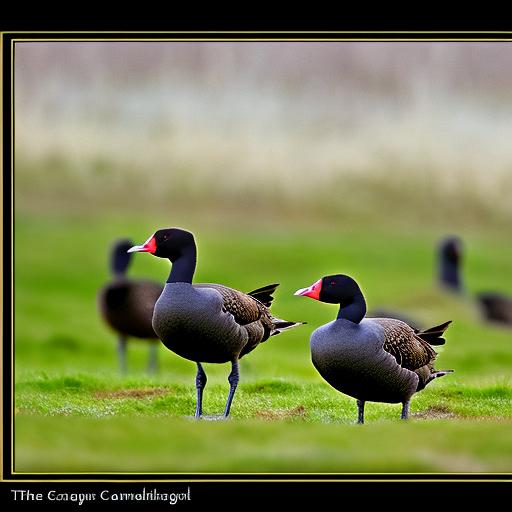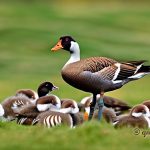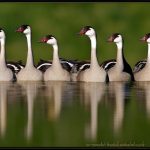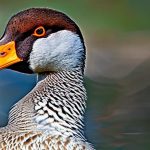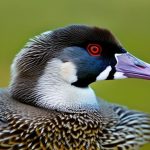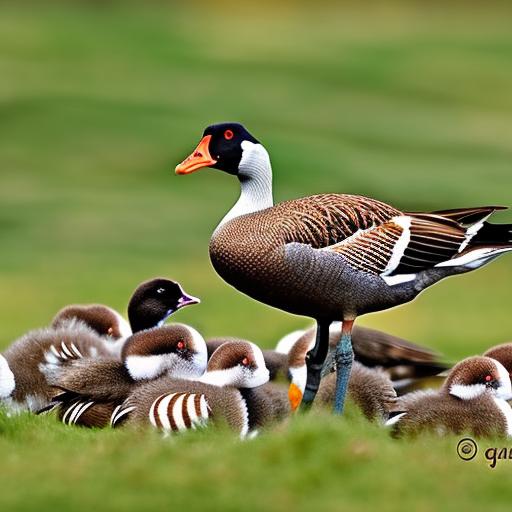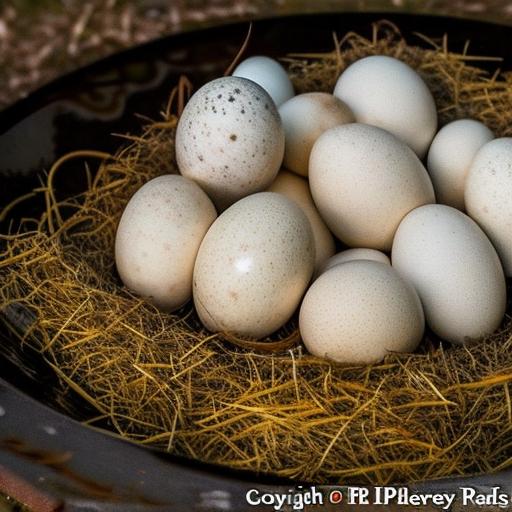Black geese breeds are a popular choice for both pet owners and farmers alike. These geese are known for their striking black plumage and unique characteristics. Geese have been domesticated for thousands of years and have played an important role in agriculture and as companions. In this article, we will explore the physical characteristics, history, popular breeds, breeding and raising tips, uses in agriculture, pros and cons as pets, health and care, conservation efforts, and the future of black geese breeds.
Key Takeaways
- Black geese breeds are a unique and fascinating group of birds that have been bred for their dark plumage and other desirable traits.
- Understanding the physical characteristics of black geese breeds is important for breeders and enthusiasts alike, as it can help to identify different varieties and select the best birds for breeding.
- The history and origin of black geese breeds is a complex and fascinating topic, with many different theories and stories surrounding their development over time.
- There are many different varieties of black geese breeds, each with their own unique characteristics and uses in agriculture and other industries.
- Breeding and raising black geese requires careful attention to their needs and behavior, as well as a good understanding of the breeding process and techniques for raising healthy birds.
Understanding the Physical Characteristics of Black Geese Breeds
Black geese breeds are known for their beautiful black plumage, which sets them apart from other breeds. They have a sturdy build with a long neck and a large body. The males are generally larger than the females and have a more pronounced knob on their beak. The females tend to be slightly smaller and have a less prominent knob.
In addition to their black feathers, black geese breeds often have orange or pink feet and bills. They also have strong wings that allow them to fly long distances. Their eyes are usually dark in color, which adds to their striking appearance.
The History and Origin of Black Geese Breeds
Black geese breeds have a long history that dates back thousands of years. They were first domesticated in ancient Egypt and were prized for their meat, eggs, and feathers. From there, they spread to other parts of the world, including Europe and Asia.
Different countries have their own unique black geese breeds. For example, the Chinese Swan Goose is believed to have originated in China and is known for its graceful appearance and gentle temperament. The African Goose is native to Africa and is known for its adaptability to different climates.
Popular Black Geese Breeds: An Overview of the Different Varieties
There are several popular black geese breeds, each with its own unique characteristics. The Chinese Swan Goose, as mentioned earlier, is one of the most well-known black geese breeds. It has a long neck and a graceful appearance. The African Goose is another popular breed, known for its adaptability and hardiness.
Other popular black geese breeds include the Sebastopol Goose, which has curly feathers, and the Toulouse Goose, which is known for its large size and meat production. Each breed has its own unique traits and qualities that make it desirable for different purposes.
Breeding and Raising Black Geese: Tips and Techniques
Breeding and raising black geese requires careful attention to their needs and proper nutrition. It is important to provide them with a balanced diet that includes a mix of grains, greens, and protein. They also need access to fresh water at all times.
When breeding black geese, it is important to provide them with a suitable nesting area where they can lay their eggs. The female will typically lay a clutch of eggs and then incubate them for about 30 days until they hatch. It is important to provide a safe and comfortable environment for the goslings to grow and develop.
Black Geese Breeds in Agriculture: Uses and Benefits
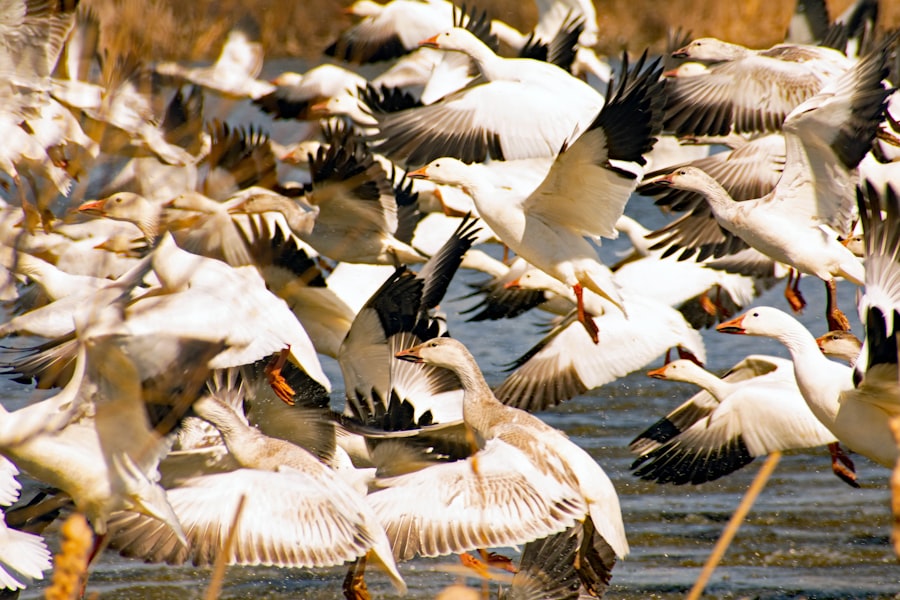
Black geese breeds have been used in agriculture for centuries due to their many benefits. They are excellent foragers and can help control pests in fields and gardens. They also produce high-quality meat and eggs, making them a valuable resource for farmers.
In addition to their agricultural uses, black geese breeds are also used in conservation efforts. They are often used to restore wetlands and other natural habitats by grazing on invasive plants and improving water quality.
Black Geese Breeds as Pets: Pros and Cons
Keeping black geese breeds as pets can be a rewarding experience, but it also comes with its challenges. On the positive side, black geese breeds are social animals and can form strong bonds with their owners. They are also relatively low-maintenance and can adapt well to different environments.
However, black geese breeds require a lot of space to roam and graze. They can be noisy and messy, which may not be suitable for all living situations. Additionally, they have a strong instinct to migrate, so it is important to provide them with a secure enclosure to prevent them from flying away.
Health and Care of Black Geese Breeds: Common Issues and Solutions
Like any other animal, black geese breeds can face health issues that require proper care and attention. Some common health issues include respiratory infections, parasites, and foot problems. It is important to provide them with regular veterinary care and to monitor their health closely.
To prevent health issues, it is important to provide black geese breeds with a clean and safe environment. This includes regular cleaning of their living area, providing fresh water and food, and ensuring they have access to proper nutrition.
Black Geese Breeds in Conservation: Efforts to Preserve Endangered Species
Some black geese breeds are considered endangered or at risk of extinction. Efforts are being made to preserve these breeds through conservation programs and breeding initiatives. These efforts aim to maintain genetic diversity and prevent the loss of valuable traits.
Conservation organizations work closely with farmers and breeders to ensure the survival of endangered black geese breeds. They provide support and resources to help breeders maintain healthy populations and promote responsible breeding practices.
Future of Black Geese Breeds: Challenges and Opportunities in the Modern World
The future of black geese breeds depends on the efforts of breeders, conservationists, and the general public. Education and awareness play a crucial role in preserving these breeds and ensuring their survival for future generations.
Challenges such as habitat loss, climate change, and genetic erosion pose threats to black geese breeds. However, there are also opportunities to promote sustainable farming practices and conservation efforts that can help protect these breeds.
In conclusion, black geese breeds are a fascinating and valuable part of our agricultural and pet communities. Their unique characteristics, history, and uses make them a popular choice for many people. By understanding their needs and taking proper care of them, we can ensure the survival and well-being of these beautiful birds for years to come.
If you’re interested in learning more about black geese breeds, you might also want to check out this informative article on poultrywizard.com. It discusses the different types of chicken coops and provides helpful tips on how to convert a shed into a suitable coop for your feathered friends. Whether you’re a beginner or an experienced chicken keeper, this article will provide valuable insights and guidance. To read more, click here: https://poultrywizard.com/keeping-chickens/convert-shed-to-chicken-coop/.
FAQs
What are black geese breeds?
Black geese breeds are domesticated geese that have black feathers. They are bred for their meat, eggs, and feathers.
What are some examples of black geese breeds?
Some examples of black geese breeds include the African goose, the Chinese goose, the Sebastopol goose, and the Toulouse goose.
What is the size of black geese breeds?
Black geese breeds vary in size depending on the breed. Some breeds, like the African goose, can weigh up to 20 pounds, while others, like the Chinese goose, are smaller and weigh around 8-10 pounds.
What is the lifespan of black geese breeds?
The lifespan of black geese breeds can vary depending on the breed and how well they are cared for. On average, geese can live up to 20 years.
What is the temperament of black geese breeds?
The temperament of black geese breeds can vary depending on the breed and how they are raised. Some breeds, like the African goose, can be aggressive, while others, like the Toulouse goose, are known for being calm and friendly.
What is the diet of black geese breeds?
Black geese breeds are omnivores and eat a variety of foods, including grass, grains, insects, and small animals like snails and worms.
What is the breeding season for black geese breeds?
The breeding season for black geese breeds can vary depending on the breed and the climate. Generally, breeding season occurs in the spring and summer months.
What is the purpose of breeding black geese?
Black geese breeds are bred for a variety of purposes, including meat production, egg production, and feather production. They are also kept as pets and for ornamental purposes.
Meet Walter, the feathered-friend fanatic of Florida! Nestled in the sunshine state, Walter struts through life with his feathered companions, clucking his way to happiness. With a coop that’s fancier than a five-star hotel, he’s the Don Juan of the chicken world. When he’s not teaching his hens to do the cha-cha, you’ll find him in a heated debate with his prized rooster, Sir Clucks-a-Lot. Walter’s poultry passion is no yolk; he’s the sunny-side-up guy you never knew you needed in your flock of friends!

